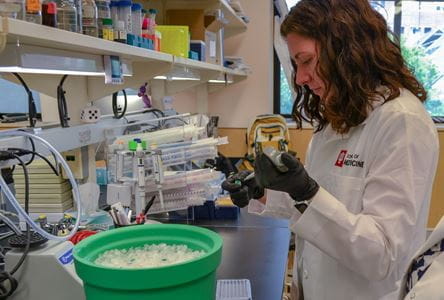On Monday, the Human Islet Research Network (HIRN) recognized Amelia Linnemann, PhD, with the 2018 New Investigator Award. Linnemann, an assistant professor in the IU School of Medicine Department of Pediatrics and an investigator within the Herman B Wells Center for Pediatric Research and the Center for Diabetes and Metabolic Diseases, is one of only three investigators nationwide to receive the award and join the HIRN Consortium on Beta Cell Death and Survival.
“I am delighted that Dr. Linnemann was selected to receive a HIRN New Investigator Award,” says Carmella Evans-Molina, MD, PhD, program director of the Wells Center Diabetes research group and an associate director of the Center for Diabetes and Metabolic Diseases. “This honor is certainly a testament to the impact that her research is having at a national level and the outstanding environment for Type 1 diabetes research at Indiana University School of Medicine.
Linnemann’s research focus is to understand the mechanisms of pancreatic beta cell death and survival, including cellular stress factors that contribute to the pathogenesis of Type 1 diabetes. This particular award will fund her research to develop and test a platform for in vivo analysis of pancreatic islet redox dynamics, examining islet beta cell responses to oxidative stress and testing small molecule regulators for therapeutic targeting.
Although it is widely understood that such stress is damaging, the mechanisms that lead to survival—and death—in some cells remain a mystery. In vivo analysis of the dynamic process has been limited because the reaction occurs quickly. In a novel approach, Linnemann and her research team have developed a platform to examine these processes as they happen. By using biosensors that can be expressed selectively in beta cells, the group is able to witness, in real time, the antioxidant response and redox dynamics in human islets.
Progress in this arena could not only deepen modern understanding of disease development for Type 1 diabetes, but also provide an enabling platform for future research—especially for therapeutic targeting. By providing a physiological setting to test potential therapeutics, Linnemann’s findings may improve the effectiveness and success of future clinical trials for patients with Type 1 diabetes.
